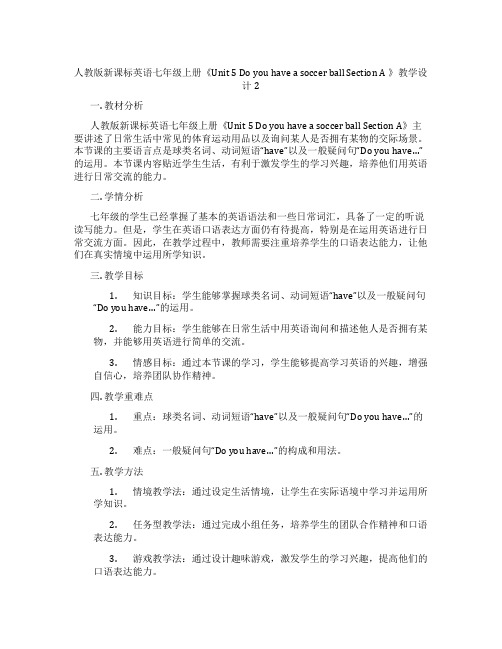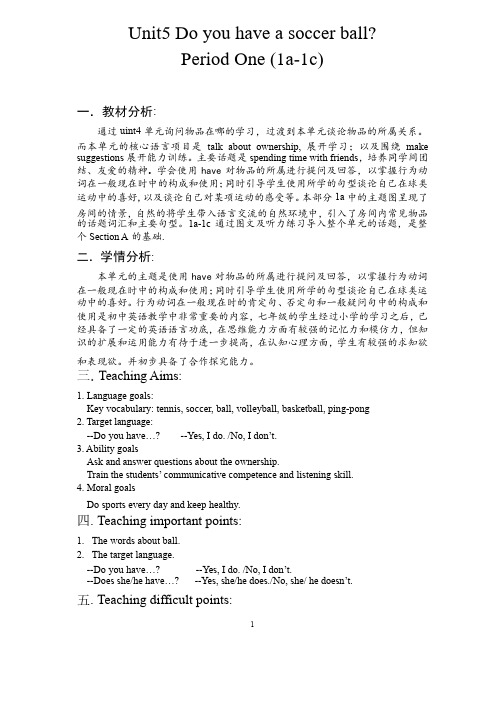初中英语 人教新目标七年级上学期Unit 5 Do you have a soccer ball_课时同步训练
- 格式:docx
- 大小:27.58 KB
- 文档页数:10

新目标人教版七年级英语上册Unit5 Do you have a soccerball?第一课时SectionA(1a-2c)教学设计金安苑学校刘团业一、关于教材1.单元分析:本单元的教学主要内容是:学习have 的一般现在时的疑问式的肯定和否定回答,该话题与学生的日常生活紧密联系在一起,容易唤起学生的学习兴趣,这对于提高学生的综合能力很有帮助,特别是说的能力。
本单元仍在继续学习一般现在时,这是一个生活中离不开的时态,也是最基本的一个时态。
新课程标准要求学生重点掌握一般现在时,这在英语中使用频率很高,学好这一时态的用法对以后其他时态的学习和交际有很大的帮助。
但与前几个单元be 动词的一般现在时不同,本单元开始了实义动词一般现在时的一般疑问句及其答语的教学。
2.课时分析:本单元的第一课时,是一堂听说课。
以球类物品为载体学习使用Do you have ...?/Does he/she have ...?让学生掌握实意动词的一般疑问句及其答语。
在教学设计中我以“第一课时的听说教学为第二课时的语法教学打好基础,但该在语法课讲的内容绝不挤占听说时间”为出发点,对本课的句型进行了拓展:I (don’t)have...;He/She (doesn’t have)has...但仅仅是通过大量和反复地操练是使学生运用自如,而不急于提醒has和have的使用场合。
既为后面的学习做好铺垫又留有余地。
二、学生分析学生现有的能力与已掌握的知识:学生在已经学过词汇:What is this ?What is that?句型:Where is… It’s in / on / under/…经过前面的学习学生已经积累了一定的词汇,掌握了一定的目标语,已经具备了一定的听说读写能力。
三、教学目标1.语言知识词汇:A.重点掌握表示有关各种运动球类的名词重点句型:---Do you have a ... ?---Yes,I do./No,I don’t.---Does he/she have a soccer ball ?---Yes,he/she does./No,he/she doesn’t.2.语言技能:能通过图片及实物使用目标句型进行交际。

人教版新课标英语七年级上册《Unit 5 Do you have a soccer ball Section A 》教学设计2一. 教材分析人教版新课标英语七年级上册《Unit 5 Do you have a soccer ball Section A》主要讲述了日常生活中常见的体育运动用品以及询问某人是否拥有某物的交际场景。
本节课的主要语言点是球类名词、动词短语“have”以及一般疑问句“Do you have…”的运用。
本节课内容贴近学生生活,有利于激发学生的学习兴趣,培养他们用英语进行日常交流的能力。
二. 学情分析七年级的学生已经掌握了基本的英语语法和一些日常词汇,具备了一定的听说读写能力。
但是,学生在英语口语表达方面仍有待提高,特别是在运用英语进行日常交流方面。
因此,在教学过程中,教师需要注重培养学生的口语表达能力,让他们在真实情境中运用所学知识。
三. 教学目标1.知识目标:学生能够掌握球类名词、动词短语“have”以及一般疑问句“Do you have…”的运用。
2.能力目标:学生能够在日常生活中用英语询问和描述他人是否拥有某物,并能够用英语进行简单的交流。
3.情感目标:通过本节课的学习,学生能够提高学习英语的兴趣,增强自信心,培养团队协作精神。
四. 教学重难点1.重点:球类名词、动词短语“have”以及一般疑问句“Do you have…”的运用。
2.难点:一般疑问句“Do you have…”的构成和用法。
五. 教学方法1.情境教学法:通过设定生活情境,让学生在实际语境中学习并运用所学知识。
2.任务型教学法:通过完成小组任务,培养学生的团队合作精神和口语表达能力。
3.游戏教学法:通过设计趣味游戏,激发学生的学习兴趣,提高他们的口语表达能力。
六. 教学准备1.教师准备:提前准备好教学课件、球类图片、实物球类等教学资源。
2.学生准备:预习本节课内容,了解球类名词和动词短语“have”的用法。

1 Unit5 Do you have a soccer ball?Period One (1a-1c)一.教材分析:通过uint4单元询问物品在哪的学习,过渡到本单元谈论物品的所属关系。
而本单元的核心语言项目是talk about ownership, 展开学习;以及围绕make suggestions 展开能力训练。
展开能力训练。
主要话题是主要话题是spending time with friends ,培养同学间团结、友爱的精神。
学会使用have 对物品的所属进行提问及回答,以掌握行为动词在一般现在时中的构成和使用;同时引导学生使用所学的句型谈论自己在球类运动中的喜好运动中的喜好,,以及谈论自己对某项运动的感受等。
本部分1a 中的主题图呈现了房间的情景,自然的将学生带入语言交流的自然环境中,引入了房间内常见物品的话题词汇和主要句型。
1a-1c 通过图文及听力练习导入整个单元的话题,是整个Section A 的基础.二.学情分析:本单元的主题是使用have 对物品的所属进行提问及回答,以掌握行为动词在一般现在时中的构成和使用;同时引导学生使用所学的句型谈论自己在球类运动中的喜好。
行为动词在一般现在时的肯定句、否定句和一般疑问句中的构成和使用是初中英语教学中非常重要的内容,七年级的学生经过小学的学习之后,已经具备了一定的英语语言功底,在思维能力方面有较强的记忆力和模仿力,但知识的扩展和运用能力有待于进一步提高,在认知心理方面,学生有较强的求知欲和表现欲。
并初步具备了合作探究能力。
三. Teaching Aims:1. Language goals:Key vocabulary: tennis, soccer, ball, volleyball, basketball, ping-pong2. Target language:----Do you have…? Do you have…?----Yes, I do. /No, I don’t.Yes, I do. /No, I don’t. 3. Ability goalsAsk and answer questions about the ownership.Train the students’ communicative competence and listening skill.4. Moral goalsDo sports every day and keep healthy.四.Teaching important points: 1. The words about ball.2. The target language.----Do you have…? Do you have…? ----Yes, I do. /No, I don’t.Yes, I do. /No, I don’t. ----Does she/he have…? Does she/he have…?----Yes, she/he does./No, she/ he doesn’t.Yes, she/he does./No, she/ he doesn’t. 五.Teaching difficult points:1. Have 与has 的使用的使用2. Do 与does 开头的一般疑问句开头的一般疑问句六.教法与学法:看图认读读单词法,模仿跟读、情境交际,合作交流等方法让学生掌握一些生活学习用品。

Unit 5 Do you have a soccer ball? Section A Grammar Focus-3c初中英语七年级上册RJGrammar: 行为动词have 的一般现在时;助动词do 的用法Learning goalsSentences:1.—Do you have a baseball? —Yes, I do./No, I don’t.2.—Does she have a tennis ball? —Yes, she does./No, she doesn’t.3.—Well, let’s play basketball. —That sounds good.Ask and answer.Do you have a soccer ball?Yes, I do.√Warming upDo you have a tennis ball?No, I don’t.×Yes, he does.Does your brother have a basketball?√No, he doesn’t.Does your brother have a baseball bat?×PresentationHow to talk about what things somebody has?Do you have a baseball?Yes, I do./No, I don’t.I have a volleyball.Do you have a ping-pong bat?Yes, I do./No, I don’t. I have a ping-pong ball.Does she have a tennis ball?Yes, she does./No, she doesn’t. She has a baseball.Does he have a soccer ball?Yes, he does./No, he doesn’t. He has two ping-pong bats.Grammar FocusDo they have abasketball?Yes, they do ./No, they don’t . They have a volleyball.don’t = do not doesn’t = does not读句子, 观察并总结do 、does 分别在什么时候使用。


人教版新目标版七年级英语上册Unit5Doyouhaveasoccerball教案Unit 5 Do you have a soccer ball1.知识与能力目标:1).能预习并说出这单元的主要内容。
2).能运用目标语言询问并描述物品所属关系。
.2.过程与方法目标:通过运用本单元的目标语言,反复练习句型“Do you have a soccer ball? ”“Yes,I do.”“No,I don’t.”从而掌握本单元的重点句型和词组。
3.情感态度与价值观:本单元通过运用过去完成时态,让同学们学会与朋友共度快乐的时光。
Section A第一课时一、课型:新课二、教学重难点:1).Do引导的一般疑问句及其回答。
2)do 和have的意义及用法3)学习有关物品的新单词:tennis、ping-p ong、soccer ball 、volley ball、basketball、baseball、bat。
三、教学准备:多媒体,录音机四.教学过程:1.课前预习回顾上单元所学内容,引出本单元新句型:T:Where’s my book?S: It’s on your desk.T: Where are my pens?S:They’re in your box.T: Yes,thank you! I have a pen,do yo u have a pen?S:Yes,I do./No,I don’t.2.正课教授(1)引入①观察25页图片,引入新单词的学习。
②学习do引导的一般疑问句及其肯定回答和否定回答。
have的用法:①have为实义动词,意为“有”,常用句型sb.have/has+sth.表示某人有某物。
当主语为第三人称单数时,have用其第三人称单数形式。
②have还有“吃、喝”的意思,如:have breakfast。
③含有have的句子变否定句要在have前加don’t;含有has的句子变否定句要在h as前加doesn’t,has变为have。
初一上册Unit 5 Do you have a soccer ball?一、单词精讲1. 体育运动词汇积累Basketball, soccer, bat, tennis, racket, volleyball, baseball2. have的用法(1) 有,拥有Do you have a soccer ball?I have a great sports collection.(2) 吃,喝I often have milk and eggs for breakfast.Do you usually have tea in the afternoon?What do you often have for your three meals?(3) have to 用来表示义务、必须做某事I have to finish my homework tonight.-Jenny, can you come to my party on Sunday?-I’d love to, but I have to help my parents with some housework.(4) 常见搭配:have a walk, have a rest, have a try3. let v. 允许,让【常用表达】Let’s do sth.Let’s go swimming!Let’s play football now!这是一个以动词let开头的祈使句。
祈使句是指命令、建议对方做什么的句子,一般结构是“动词原形+其他”:Open the door, please!Look at the blackboard, now!否定句结构为“Don’t+动词原形+其他”:Don’t be late for class next time.Don’t listen to the man. He is lying.【知识拓展】(1) let’s 与let us的区别Let’s意为“咱们……吧”,一般包括听者在内,例如:Let’s play soccer.Let us意为:让我们……吧“,一般不包括听者在内,例如:Let us know your name.告诉我们你的名字吧!(2) 表达“让某人做某事”的固定结构总结:Have/make sb. do sth.Get sb. to do sth.Keep sb. doing sth.Susan’s various teaching methods make me realize the charm of British culture.His specific description got me to know the truth.The boss keeps his employees working for over twelve hours every day.4. onlyAdv. 只,仅仅Adj. 唯一的,仅有的The lawyer is paid only if he wins. 律师只有打赢官司才会被付费。
人教版英语七年级上册Unit 5 Do you have a soccer ball?单元教材分析本单元主要学习动词have的一般现在时的用法;使用do和does引导的一般疑问句的构成以及简单回答。
本单元围绕“和朋友一起欢度时光”这一话题安排了三个任务:一是列举所学的运动项目,从中挑选出各自喜欢的体育项目,并说明原因,目的是巩固并新学一些体育项目的名词;二是让学生互相询问所爱好的运动,并根据情况发出邀请,学会用have对物品的所属进行提问与回答,掌握用do和does引导的一般疑问句的构成及使用,了解用Let’s提建议的句型;三是写作,把任务一、二的完成情况写成日记,进一步复习、巩固所学的语言目标。
通过本单元的学习,学会用have对物品的所属进行提问与回答;学会用let’s…句型提建议;能够谈论自己喜欢哪些球类运动,不喜欢哪些球类运动及原因;能够谈论怎样和自己的朋友度过一段愉快的时光。
单元总体目标.1. 在询问对方是否有某物的对话中学会使用do和does引导的一般疑问句。
2. 学会使用描述性的形容词来评价事物。
3. 学会在对话中使用名词复数。
4. 学会用祈使句来向对方提出建议。
5. 学会用祈使句询问某人是否有某物。
6. 学会向他人提出建议的句子。
7. 学习了解一般现在时。
8. 在本单元中,通过阅读有关运动的文章和对话,使学生更加热爱体育活动并培养一种适合自己的体育爱好。
9.在小组活动中,培养学生团结协作精神。
本单元的主题是使用have对物品的所属进行提问及回答,以掌握行为动词在一般现在时中的构成和使用;同时引导学生使用所学的句型谈论自己在球类运动中的喜好。
行为动词在一般现在时的肯定句、否定句和一般疑问句中的构成和使用是初中英语教学中非常重要的内容,本单元知识的掌握程度将直接影响今后的英语学习。
学生在以前的学习中已经掌握了be动词在一般现在时中的构成和使用,在学生的头脑中也已经形成了一个模式,这种模式将直接影响学生对本单元知识内容的接受,所以教师在教学中一定要善于引导,以免学生养成不良习惯。
Unit 5 Do you have a soccer ball?第一课时:Section A 1a-1c课时同步练习【基础训练】Ⅰ.要点词汇翻译单词1.足球2.排球3.篮球4.棒球5.乒乓球6.网球7.球Ⅱ.根据汉语意思完成句子8.a baseball bat9.a tennis racket10.a ping-pong batⅢ.翻译句子11.你有苹果吗?you apple?12.我没有游戏机。
I computer game.【综合运用】Ⅰ.单项填空1.My friend Sue volleyball in her room.A.has aB.have aC.hasD.have2.—Let’s play soccer now.—.A.Yes, I doB.Sorry, I don’tC.No, I don’tD.OK.Let’s go3.Do you have ping-pong bats?A.theB./C.aD.an4. your friend a tennis racket?A.Does, haveB.Do, haveC.Is, hasD.Does, has5.Let’s and soccer on the playground(操场).A.to go, to playB.go, play1C.to go, playD.go, to playⅡ.补全对话A:Hello, John!B:Hi, Mike!A: 6 Do you have a basketball?B: 7 Ask my brother Tony.He has one.A:Excuse me, Tony. 8C:Yes, I do.It’s under my bed.Let me go and get it. A: 9 .Let’s go and play basketball.B&C:OK. 10Unit 5 Do you have a soccer ball?第二课时:Section A 2a-3c课时同步练习【基础训练】Ⅰ.要点词汇翻译单词1.让2.去3.有4.取得,得到5.好的6.打,玩7.听起来8.好极了,很棒9.迟到10.问Ⅱ.翻译短语211.咱们走吧12.迟到13.玩篮球14.听起来不错Ⅲ.根据汉语意思完成句子15.他没有书包。
He schoolbag.16.Tom有篮球吗?Tom a basketball?17.我想你也有乒乓球吧。
I you a ping-pong ball, .18.太好了!咱们打篮球去吧。
! play basketball!【综合运用】Ⅰ.单项填空1.—Let’s play .—Good.Let’s go.A.a ping-pongB.a ping-pong ballC.ping-pongD.the ping-pong2. I have a ping-pong bat.Do you have ?A.don’t, aB.doesn’t, oneC.don’t, oneD.not, bat3.—Does Bob have a soccer ball?—.A.No, he doesn’tB.Yes, he hasC.No, Bob doesn’tD.Yes, Bob does4. I have a computer game in my room.Let get it.A.IB.meC.weD.you35. — Jean and Gina have a baseball? —Yes, they .A.Do, doB.Do, haveC.Does, doesD.Does, hasⅡ.完形填空A:Do you want to play computer games?B:Yes,I do.Do you 6 a computer game?A:No, I don’t.B:Then(那么), 7 play basketball.A:Do you have 8 ?B:No, I 9 .I think John 10 .Let’s ask him. A:OK.Let’s go.6.A.have B.hasC.playD.plays7.A.let B.let usC.let’sD.let we8.A.a basketball B.basketballC.volleyballD.the soccer ball9.A.not have B.don’t haveC.don’tD.do10.A.has one B.have oneC.has itD.have basketballUnit 5 Do you have a soccer ball?第三课时Section B 1a—2c课时同步练习【基础训练】Ⅰ.要点词汇翻译单词1.有趣的2.没趣的,乏味的3.困难的4.轻松的45.容易的Ⅱ.翻译短语6.play soccer7.watch TV8.love sports9.easy for me10.with my classmates11.at school12.go to the same school13.after classⅢ.根据汉语意思完成句子14.我没有足球,但是约翰有。
I a soccer ball, John .15.他爱好运动,但是他不运动。
He sports, he them.16.我不玩游戏,但是我的弟弟玩。
I games, my brother .17.放学后,我和我的朋友们一起打乒乓球。
I ping-pong my friends school.【综合运用】Ⅰ.单项填空1.—Let’s play .—That sounds interesting.A.a soccerB.the baseballputer gamesD.ping-pongs2.I don’t a computer,but my uncle one.A.have, haveB.has, hasC.have, hasD.has, have3.—Let’s.—That sounds boring.A.watch the TVB.play the soccerC.play a soccerD.watch TV4. Let’s my brother.A.go and findB.go find5C.go but findD.find and go5.The book is .It’s not fun.A.difficultB.boringC.interestingD.relaxingⅡ.完形填空A:Hi, Jenny! Let’s play 6 computer games.B:That 7 interesting.But I don’t have a computer.A:Well, 8 you have a volleyball?B:Yes, I do.A:Then 9 play volleyball.B:Oh, volleyball 10 so difficult.A:OK,let’s11 .B:That sounds 12 .A:Hmm …Let’s play soccer.Do you have 13 soccer ball? B:No, I don’t.A:Oh,well.Do you have 14 ?B:Yes, I do.A:Let’s play 15 .B:That sounds fun.6.A.a B.theC.anD./7.A.sounds B.soundC.haveD.has8.A.do B.doesC.areD.is9.A.let’s B.weC.letD.let us10.A.are B.hasC.isD./11. A.watch the TV B.read bookC.watches TVD.watch TV12. A.boring B.interestingC.goodD.fun13.A.a B.the C.an D./614. A.basketball B.a basketballC.the basketballD.the basketballs15.A.basketball B.a basketballC.the basketballD.the basketballsUnit 5 Do you have a soccer ball?第四课时Section B 3a—Self Check课时同步练习【基础训练】Ⅰ.要点词汇翻译单词和短语1.同样的,相同的2.体育运动3.只,仅4.班级5.喜欢;喜爱6.在……以后7.在电视上8.爱书9.放学以后10.难但有趣11.喜欢它们Ⅱ.根据汉语意思完成句子12.嘿,Tom!咱们玩电脑游戏吧!Hi,Tom! computer games!13.我喜欢玩游戏,可是我没有游戏机。
I playing games, I a computer game.14.你有游戏机吗?you a computer game?15.是的,我有,可是它在家里。
Yes,I , at home.716.我去拿它。
get it.【综合运用】Ⅰ.单项填空1. I don’t like sports, my brother does.A.andB.butC.orD./2. Jenny,let’s Tom for the tape player.A.to askB.asksC.askD.asking3. I don’t play computer games , but I play them at home.A.at homeB.at schoolC.on TVD.on the radio4.Does your father play sports, ?A.andB.butC.withD.too5.We can learn a lot of things .A.on TVB.on the TVC.on bookD.in TVⅡ.阅读理解Frank doesn’t have a soccer ball, but his brother Alan has one.They go to the same school but they are in different(不同的) classes.Frank is in Class4 and Alan is in Class 6.The Two brothers love soccer.They play it at schoolwith their friends.It is interesting and relaxing for them.6. Frank has .A.a soccer ballB.a brotherC.a sisterD.two brothers7. Frank and Alan go to .A.the same schoolB.the same classC.different schoolsD.Class 48. Frank is in .A.the same classB.different classesC.Class 4D.Class 69. Frank and Alan soccer.A.don’t playB.don’t likeC.watchD.like10. The two brothers play soccer .A.at homeB.with their parentsC.with their friendsD.after school8【参考答案1】【基础训练】Ⅰ. 1.soccer 2.volleyball 3.basketball 4.baseball 5.ping-pong 6.tennis 7.ballⅡ. 8.一个棒球棒9.一个网球拍10.一个乒乓球拍Ⅲ.11.Do, have an 12.don’t have a【综合运用】Ⅰ.1.A 2.D 3.B 4.A 5.BⅡ.6.C7.B 8.E 9.A 10.D【参考答案2】【基础训练】Ⅰ. 1.let 2.go 3.have 4.get 5.good 6.play 7.sound 8.greatte 10.askⅡ.11.let’s go 12.be late 13.play basketball 14.sound(s) goodⅢ.15.doesn’t have a 16.Does, have 17.think, have, too 18.Great, Let’s【综合运用】Ⅰ.1.C 2.C 3.A 4.B 5.AⅡ.6.A7.C 8.A 9.C 10.A【参考答案3】【基础训练】9Ⅱ. 6.B 7.A 8.C 9.D 10.C Ⅰ. 1.interesting 2.boring 3.difficult 4.relaxing 5.easyⅡ.6.踢足球7.看电视8.爱好运动9.对我来说容易10.和我的同学一起11.在学校12.上同一所学校13.课后Ⅲ.14.don’t have, but, does 15.loves, but, doesn’t play 16.don’t play,but, does 17.play, with, after【综合运用】Ⅰ.1.C 2.C 3.D 4.A 5.BⅡ.6.D7.A 8.A 9.A 10.C 11.D 12.A 13.A 14.B 15.A【参考答案4】【基础训练】Ⅰ. 1.same 2.sport 3.only 4.class 5.like 6.after 7.on TV 8.lovebooks 9.after school10.difficult but interesting 11.like themⅡ.12.Let’s play 13.love, but, don’t have 14.Do, have 15.have, butit’s16.Let me【综合运用】Ⅰ. 1.B 2.C 3.B 4.D 5.A10。